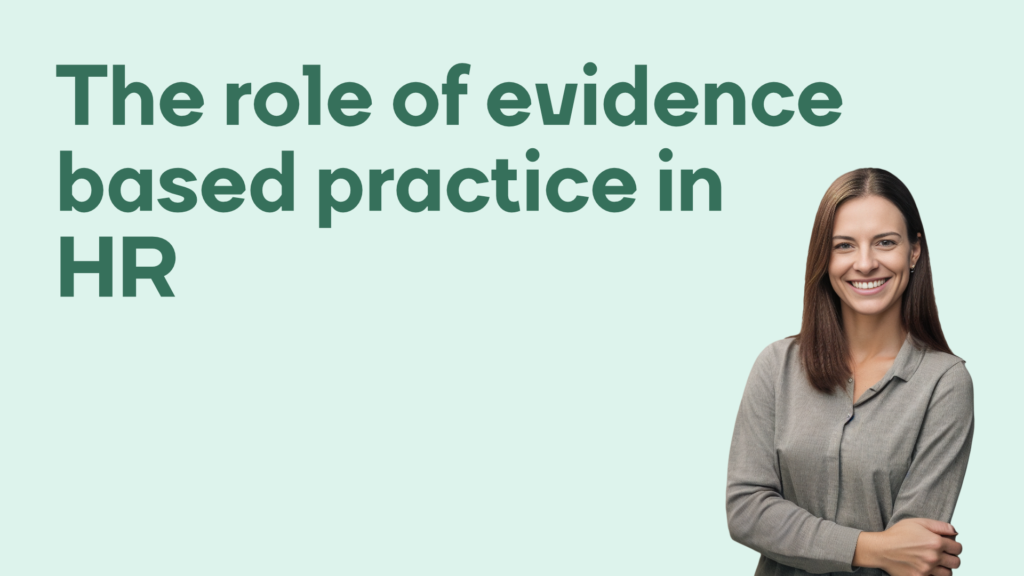Last month Clevry had the opportunity to meet with organisational psychology professor Rob Briner for a chat and explore his perspectives on Evidence-Based practice in recruitment assessment, supporting employee mental health, implementing HR technology, evaluating soft skills, and emerging trends in the HR industry.

How did your interest within Evidence-Based Practices occur and could you explain how it works?
Briner explains that his interest in evidence-based practice stemmed from his experiences as an academic researcher and educator.
“I noticed that often the research that we were doing as academics wasn’t really getting picked up. And also, when we were teaching students around work psychology, and I spoke to them often, they weren’t using or weren’t able to use some of that research. “
Evidence-based practice, according to Briner, involves using a combination of scientific evidence, practitioner experience, organisational data, and stakeholder perspectives to inform decision-making. By critically appraising the best available evidence and adopting a structured approach, organisations can identify problems or opportunities, intervene effectively, and make informed decisions.
How do recruitment assessments contribute to evidence-based recruiting?
Briner emphasises the importance of aligning recruitment assessment with organisational goals. Rather than focusing solely on identifying the best candidate, HR should start by understanding what the organisation aims to achieve.
This understanding enables HR to determine whether they need the “best” candidates or individuals who are “good enough” for the job. By considering the relevance of specific skills or abilities, HR can tailor recruitment assessments to align with organisational objectives.
“Everybody always uses evidence, but that’s not the same as evidence-based practice”, Briner says.
How can organisations utilise Evidence-Based Practices to effectively support employee’s mental health and provide well-being and positive emotions in the workplace?
Briner highlights the need for a comprehensive understanding of employees’ well-being before implementing well-being initiatives. Many organisations introduce well-being policies without assessing the specific needs of their employees.
“It seems to me very common that organisations introduce policies around well-being without understanding much about what the problem, issue or opportunity. One example is mental health first aid training, which is quite a popular thing where you help individuals to learn about mental health, to learn about stigma.
And again, it’s clear now that while that training does help those individuals become more aware of mental health and educate them about it, it’s not clear it does much to overall help the mental health of employees in that organisation.” Briner sums it up by saying that organisations should focus on assessing employee well-being and implementing interventions based on evidence of their effectiveness.
Is there a way to use Evidence-Based Practices when implementing a new HR technology? What should companies be aware of and what are the most significant pitfalls?
“My experiences of people using tech around people analytics is often it can seem very fancy and very sophisticated and very complicated and very amazing. And then if you say, well, what is the insight, what is the issue? What does it really help with in terms of what the organisation is trying to do? Often the answer to that question is not very clear.”
Briner continues, “It is crucial to understand how the technology helps organisations gain insights into employee behaviour and evaluate the impact of interventions. Rather than using technology for its own sake, organisations should leverage it as a tool to support decision-making and align HR practices with organisational objectives. “
How can Evidence-Based Practices be applicable when looking at a person’s soft skills in relation to understanding if the person will be a good fit for a job?
While assessing soft skills for job fit can be challenging, Briner emphasises the role of evidence-based practice in understanding their relevance.
“It is crucial to examine whether these skills contribute to individual performance and align with organisational objectives. HR should not solely rely on individual or team performance metrics but focus on the extent to which performance connects to organisational success. This challenge is particularly evident in knowledge work, where the link between individual behaviour and organisational outcomes may be less direct,” Briner explains.
What are some of the most promising trends or initiatives you have seen recently in the HR industry, and how do you see trends evolving over time?
Briner recognises the growing acceptance of evidence-based HR, with people analytics being a prominent trend. However, he emphasizes that people analytics alone is limited and should be integrated into a broader evidence-based HR framework.
“People analytics is not delivering as well as it could and my answer to why that is, is because it’s not incorporating other sources of evidence enough and it’s not taking a structured approach. By incorporating stakeholder understanding, professional expertise, and scientific evidence, organisations can make more informed decisions.”
Briner sees this trend as a positive step towards ensuring HR practices align with organizational objectives but acknowledges there is still progress to be made.




